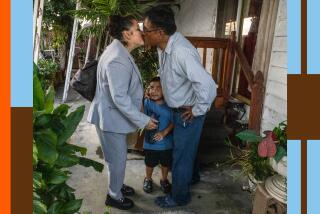Church Official Warns Vietnamese of ‘Pitfalls’ : Ministers Urged to Avoid ‘Immigrant Mentality’ That Can Be a Barrier for New Churches in U.S.
- Share via
Speaking in English through an interpreter, a Chinese-American church official told a gathering of Vietnamese ministers Friday that most newcomers to the United States develop an “immigrant mentality,” a form of economic insecurity.
The attitude of “let me take care of my own first” is a barrier to the growth and cooperation of new churches, according to Paul Theophilus, executive secretary of the North American Commission of Chinese Evangelicals.
Theophilus offered the experiences of the Chinese churches in America as a guide to his Vietnamese counterparts at a seminar of the first Vietnamese Church Development Conference at the Garden Grove Friends Church.
The session, attended by 25 of the 200 ministers and church leaders at the conference, was the only one offered in English during the three-day gathering.
‘Material Attractions’
Like others who have ministered to American immigrants, one of the greatest problems faced by Asian church leaders has been the temptation of “material attractions” offered by life in a prosperous country.
The purpose of Theophilus’ appearance, said the Rev. Nguyen Xuan Duc, a conference organizer, was to help Vietnamese churches “to avoid pitfalls” of other Asian-American churches, “so we won’t have to repeat their mistakes.” Today, Vietnamese churches in the United States face a situation that is similar to the experience of Chinese-American churches in the 1940s and 1950s, Duc said.
Throughout Asian history, China and Vietnam shared elements of language and culture, and were alternately allies and adversaries. Most recently, in 1979, border tensions and a dispute over a third neighbor, Cambodia, led to a brief but bloody war in which China invaded Vietnam.
Successful communist revolutions in both nations--China in 1949, Vietnam in 1975--produced increased immigration to the United States. According to Duc, about 15% of the estimated 65,000 Vietnamese now living in Orange County are actually ethnic Chinese who lived in Vietnam for centuries, but were driven out by the Hanoi government in the late 1970s.
Traced History of Churches
Theophilus thanked Duc for a lengthy introduction, although, he said: “I didn’t know a single word you said,” before tracing the history of Chinese churches in North America, which he said closely paralleled the history of Chinese immigration. His remarks were interpreted into Vietnamese by the Rev. Tuan Anh Nguyen of Dallas.
Chinese immigrants to the United States experienced hardships periodically, especially during economic downturns, Theophilus said. In the depression following the Civil War, he said, “competition between white laborers and Chinese immigrants” fostered “an anti-Chinese atmosphere.”
In order to avoid persecution, he said, the immigrants dispersed from Chinatown population centers on the West Coast and “tried to engage in non-competitive businesses,” such as restaurants and laundries. He suggested that as years pass, the Vietnamese would do the same.
‘Model of Minorities’
Over time, Theophilus said, “many (Chinese) . . . succeeded in their education as well as their professions,” and when they “were no longer seen as a refugee-type people who refused to assimilate,” American society began to hold them up as a “model of minorities.”
Of the 100 Chinese-American churches in the Greater Los Angeles area, Theophilus said, between 20 and 30 are in Orange County, and the Taiwanese Church “is one of the fastest-growing churches in the area” because it has been able to adapt to its environment and changes within the Chinese community.
Asian-American churches often reach a point when American-born congregants become a significant factor, Theophilus said, thus creating some tensions. American-born worshipers may prefer services in English, he explained, while their elders prefer their native tongue. Younger members, brought up in the United States, may also prefer shorter sermons and different imagery.
In building and sustaining their churches, Theophilus said, Chinese ministers have found that “we need to go across our ethnicity” and to do “cross-cultural missionary work. I don’t believe there will be (a) Chinatown in heaven.”
More to Read
Sign up for Essential California
The most important California stories and recommendations in your inbox every morning.
You may occasionally receive promotional content from the Los Angeles Times.













